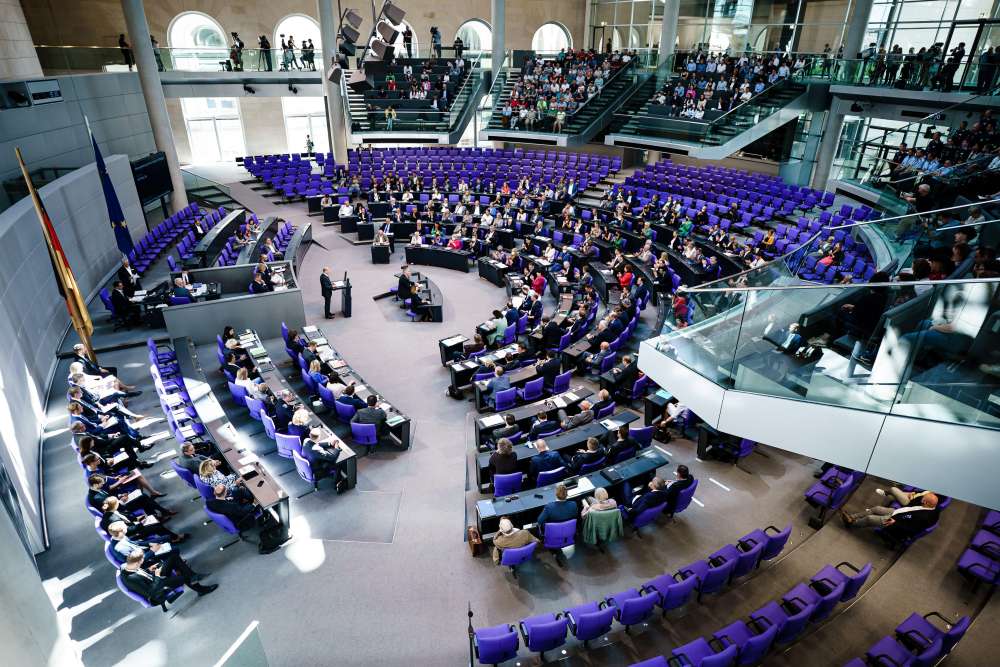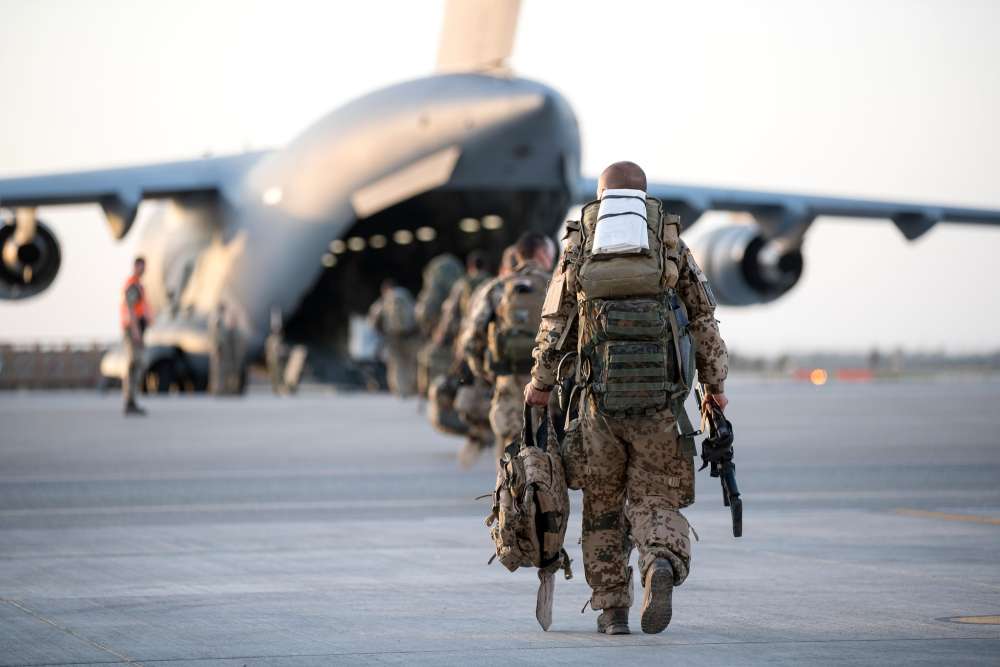Editors’ Note: Input for a Strategy with Staying Power
+49security is wrapping up. While the German government is busy making final tweaks to the country’s upcoming national security strategy, we take stock – and look back on a project that aimed to stimulate strategic thinking around Germany's security policy post-Zeitenwende.
Germany is getting a new National Security Strategy – the first ever in the country’s history. Its development fell during a time when the security situation for Germany and Europe changed drastically, and continues to change. For more than a year now, Russia has been waging a brutal war of aggression against its neighbor Ukraine. Beijing has entered into a “no-limits partnership” with the Kremlin and is behaving more and more aggressively, including vis-á-vis Taiwan. Meanwhile, confrontation between China and the United States is intensifying. In Africa’s Sahel region, authoritarian forces are undermining democratic stabilization and peacebuilding efforts. Cyber attacks, pandemics and climate catastrophes are revealing new threats. In real time, Berlin has had to grapple with the question what the events of early 2022 should mean for the future of German foreign and security policy – and to negotiate, distill into strategy and put onto paper the direction that the current governing coalition intends to take.
In his Zeitenwende (or “turning point”) speech of February 2022, German Chancellor Olaf Scholz described the consequences of Russia’s war against Ukraine: “The world ahead is no longer the same as the world before.” And indeed, a lot has changed since then: Germany is supplying heavy weapons into an active war zone and has vowed to invest a special fund of 100 billion euros into its armed forces. But is Berlin also willing to bid farewell to old maxims like “Wandel durch Handel” (change through trade) or the country’s cherished self-image as a civilian power (“Zivilmacht Deutschland”)? Does this new era post-turning point also require a turn in mindset, a cultural change? Perhaps even a new understanding of security?
A Boost for Strong Ideas
Above all, acting strategically means: prioritizing. Beyond the daily buzz of news cycles and headlines, security strategies are meant to provide a compass for political action and decision-making when tomorrow’s crises hit. Ideally, they offer direction for the entire government and transcend silos or departmental logics. And they should explain, to both internal and external audiences, how Germany sees the world and its own position and role in it.
» The contributions we published on +49security are as diverse as the challenges facing Germany's security policy itself – and purposefully so. «
Not an easy feat. Outside opinions and input can make matters even more complicated, but they can also help to boost and focus on the right ideas. In this spirit, +49security accompanied the drafting of Germany’s first National Security Strategy with the goal of providing the government with insights and recommendations. More than 170 experts from academia, civil society and politics, among them 50 international authors, had their say. In over 150 articles and interviews, they discussed the priorities that the strategy should address – and what should follow from them. The contributions we published on +49security over the past ten months are as diverse as the challenges facing Germany’s security policy itself – and purposefully so.
Security, Strategic Capability and Crisis Competence
We structured our platform around the major questions facing those drafting the strategy. In seven “debates,” we dealt with the big picture, with the question of whether and how Germany and Europe need to rethink their economic interdependencies, with Germany’s strategic capability, with its role and engagement in conflict contexts, with the future of its armed forces, with the state of the country’s internal resilience, and with what security actually means in a globalized world.
The contributors to our first debate confronted some of the overarching questions: To what extent does Germany’s Zeitendwende actually represent a turning point? Which concepts of security should underpin or inform its security strategy? How to deal with Russia? How can human security and a feminist approach become integral to the country’s foreign and security policy? Looking beyond Germany’s borders, examples from Finland, the United States, Australia, and the United Kingdom showed: there’s a lot Germany can learn from the experiences and strategy processes of other countries.
The consequences of Russia’s attack on Ukraine, above all the ensuing energy crisis, also called into question a long-held credo of German foreign policy: the “Wandel durch Handel” approach seems dead. What does this mean for Germany’s economic and trade policy? Should Berlin also reduce its dependence on the Chinese market – or is China still too important of a trading partner? Can interdependence be differentiated or even calibrated at the sector level? How Berlin should shape its economic and scientific ties going forward was the main question driving our second debate: Rethinking Interdependence.
Turning our gaze inward again, we asked experts: How to strategy? Is there truth behind the diagnosis that Germany lacks strategic capability? What skills does the country need – in politics and society – to think, act and communicate more strategically? Does it need new institutions or structures? How the right strategic concept can be translated into robust implementation was the subject of our third debate.
In debate number four, we shifted the focus abroad again, to one of the central arenas of German foreign policy: international conflict prevention and peacebuilding. While currently overshadowed by discussions around armament, deterrence and great power conflicts, Germany’s efforts in crisis contexts remain considerable. And here, too, there is a need to learn and reform, as aspirations and reality too often diverge. To ensure that Germany’s contribution to stability and peace in crisis regions is relevant, decision-makers must heed the lessons learned from Germany’s recent missions – in Mali and Afghanistan, but also in Iraq. And Berlin should improve its ability to forecast future crises with the help of early warning mechanisms and strategic foresight. To unpack what this means and could look like in practice, we talked to expert guests on our 49security podcast “Krisen von morgen” (in German).
Defense, Resilience and Global Challenges
A central question in all of this: What to do about Germany’s army and defense sector? Continuing with the status quo and simply adding an additional special fund (Sondernvermögen) will not suffice, argued Jana Puglierin in her +49security article. But even if that is not enough: the special fund exists to ensure that the Bundeswehr, and thus Germany, become capable of defense again. In our fifth debate, experts grappled with topics like what equipment, acquisitions and reforms the armed forces need for this and how Germany’s defense can be made fit for the future.
The controversies surrounding democratic responses to disinformation, cross-border corruption and authoritarian influencing as well as the debate about who should be responsible for civil protection and disaster response show: democratic and state resilience are important prerequisites for national security. The same applies to human security within Germany. Our sixth debate focused on the question where Berlin’s foundation needs repair – and one topic quickly dominated the conversation: Germany’s (lack of) cybersecurity.
Over the past year, Germany has primarily looked inward, to other states in Europe and across the Atlantic. But Berlin, the EU and even the so-called West cannot meet the complex challenges of the present and future alone. Even in a multipolar world, the climate crisis, global pandemics, and natural disasters and their consequences for ecosystems and human security remain problems that transcend boundaries. To solve acute and long-term crises of global proportions, international organizations such as the United Nations will continue to be indispensable. But how can multilateral politics function in times of emerging systemic conflict? What reforms are necessary or even possible? And what is Germany’s role in the international system? In debate seven, we wanted to better understand security in a globalized world.
Variety and Blind Spots
Our overarching goal with +49security was to stimulate debate and reflection – on these and other topics, on the purpose behind a National Security Strategy and the opportunity that it represents, and on Germany’s security and foreign policy more broadly. Like many of our authors, we employed a wide lens and understanding of security, delighted in new ideas and strong arguments, and deliberately looked beyond Germany and Europe for answers.
» Our overarching goal with +49security was to stimulate debate and reflection – on these topics and on Germany's security and foreign policy more broadly. «
The result is a cross-section of Germany’s cotemporary foreign and security policy debate. Curating it has inspired us – and we had a lot of fun doing it. Still, even though we aimed for a variety of topics and diversity in viewpoints, thematic gaps and blind spots remain – something we regret even though we knew that it would be unavoidable. On the flip side, we are excited to discover how we will evaluate our Zeitendwende discussions in a few years’ time, and how the debate on German security policy will develop from here.
To conclude, our heartfelt thanks are due first and foremost to the many +49security authors who have shared their thoughts, arguments and ideas with us and with you, our readers, as well as to the German Federal Foreign Office for funding and supporting this project.
The only thing still missing now is the National Security Strategy itself. And we are just as eager as you to find out what it has in store.
Sincerely yours,
The +49security Editorial Team
Editorial Team
Keep on reading

Editors’ Note: A Strategy for the “World After”
In opinion pieces, interviews and debates, 49security will feature suggestions on how Germany can better position itself in a world that is rapidly changing. A few words on what is to come from your editorial team.

Zeitenwende: What Has Been Missing From the Conversation?
Russia’s war against Ukraine has sparked an active public debate about German and European security policy. But not all issues have gotten the same air time.

